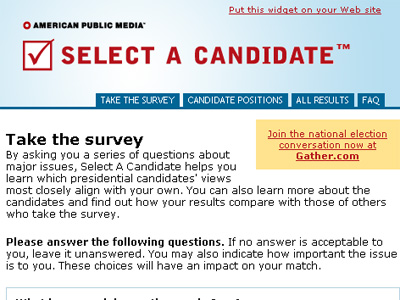I’ll be on Talk of the Nation from National Public Radio this afternoon around 1:40 p.m. (Central Time), for a segment they’re doing looking at the political quizzes that are out there.
Minnesota Public Radio started Select A Candidate many years ago and we’ve done it again this year. There’s one version here and a recently souped-up version here.
I believe I’m on with a columnist out of Chicago who wrote a column this week(which, at the moment, I cannot find online) after he took several online surveys and found he came up matched to a different candidate each time.
I can’t speak for the other surveys — some of which are well done and some of which are not — but Select A Candidate is meant to be the beginning of the online fact-gathering for people interested in candidates, not the end. You don’t — or at least you shouldn’t — log on, see which candidate you match up with, and then log off.
Neither should you assume the quiz is “wrong” if you match up with a candidate for whom you do not intend to vote. Indeed, these quizzes reinforce that we make our decisions based on many factors; issues are just one of them.
In addition, there is Bob’s Theory of Political Answers at play to explain why often marginal candidates end up as most often matched (Duncan Hunter and Tommy Tancredo occupied the top position at one point or another): Candidates are more interesting and direct in their answers if they’re less likely to be elected. Since the options people are given as answers are often the actual words of the candidate, people find — shall we say — honest and direct answers to be the most reasonable.
I’ll post a link to the Talk of the Nation audio and page later on today.

Update: 2 p.m. OK, well, that was interesting. And a little bit weird since the subtext of the segment seemed to be that there’s something wrong with these quizzes because they’re only about issues. Given the braying — much of it deserved — among columnists about horse race politics and the desire to have more discussion about issues, it was a strange juxtaposition in the criticism. Nobody believes that issues alone is what should dictate the next president. But it should be a piece of the pie.
Update 5:12 p.m. – Here’s the link to the interview at npr.org.
